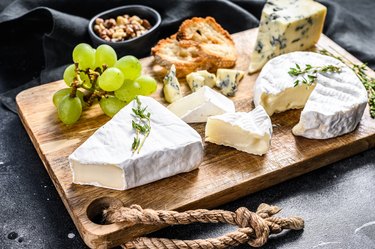
Nothing screams self-care like creamy, honey-drizzled brie cheese, paired with a few grapes and a generously poured glass of Pinot Noir. Throw on a good show and you have the fixings for a perfect solo Netflix and chill session.
Even if you're following a gluten-free diet, you can enjoy this delectable combination of flavors, as most cheeses are free of gluten and totally safe to eat. Before you buy, double-check the labels of your selections and pair them with some gluten-free crackers, too.
Video of the Day
Video of the Day
Is Cheese Gluten-Free?
Gluten is a protein found in wheat, rye and barley and these grains' derivatives.
So, considering cheese isn't a grain-based food, it's generally gluten-free and safe to eat. Most types of cheese are made using the same simple ingredients, including milk, salt, a starter culture (good bacteria) and rennet (an enzyme), according to the U.S. Dairy Export Council.
Nevertheless, cheese recipes, production and manufacturing techniques will vary, depending on the type you buy, which can also affect the potential gluten content. While most cheese, like parmesan or mozzarella, won't contain gluten, reading the packaging on the cheese you buy is crucial, according to Beyond Celiac.
Cheese can be exposed to gluten-containing ingredients either during preparation or during manufacturing, according to the Celiac Disease Foundation. So, if you're at a restaurant, verify that your cheese plate is prepared on separate surfaces and with separate utensils.
When buying packaged cheese, check the container to make sure it's safe from cross-contamination. If your package is labeled gluten-free, that means it contains less than 20 parts per million (ppm) of gluten, making it safe for people with celiac disease, according to the FDA.
In some cases, your cheese of choice may even have a Certified Gluten-Free seal on the package. In that case, the product has been tested by the Gluten-Free Certification Organization (GFCO), which looks for even more stringent standards. Any foods certified by the GFCO contain less than 10 ppm of gluten, according to the GFCO.
Buying Cheese at a Deli Counter
When you're buying cheese at a deli counter, you want to proceed with caution, especially if the deli wraps and slices their own product, according to Beyond Celiac. Often, employees will cut, prepare and package foods on the same countertops or use the same utensils, which means your cheese can be easily contaminated with gluten.
So, before you buy just any cheese from your local deli counter, look for a gluten-free symbol on the package. Or, ask a manager whether the cheese was prepared on sanitized surfaces with fresh utensils.
Tip
If you want to play it safe, it's best to avoid deli counter cheese and stick with packaged varieties.
Is Shredded Cheese Gluten-Free?
Shredded cheese is another variety that may not be safe to consume if you have a gluten sensitivity or intolerance. Although shredded cheese is usually gluten-free, it may be occasionally produced with a gluten-containing starch, which is added to prevent the cheese from sticking, according to Beyond Celiac.
Luckily, though, most shredded cheese is pre-packaged, so you can easily check the ingredient list for any gluten-based contaminants. Or, search for a gluten-free label or seal on the packaging.
Is Cream Cheese Gluten-Free?
Plain cream cheese is also usually free of gluten ingredients, according to Beyond Celiac. However, that isn't necessarily true if you're buying flavored varieties or if you're buying cream cheese from a restaurant that makes its own in-house.
Before you spread any on your morning bagel, take a second look at the packaging to make sure there are no gluten-based flavorings, like malt.
Is Blue Cheese Gluten-Free?
Typically, blue cheese is gluten-free and safe to eat — however, in some cases, it may be produced with mold cultures that are grown on wheat or rye bread.
Luckily, the amount of potential gluten even in this case is minimal and largely undetected. Nevertheless, to ensure total safety, buy a gluten-free blue cheese. Check the ingredient list for any unwanted ingredients or search for a gluten-free label.
The Bottom Line on Cheese
Those following a gluten-free eating regimen can rest assured that most cheese varieties on supermarket shelves are safe to eat. Nevertheless, there are a ton of unique flavors out there with a bunch of different preparation and manufacturing methods.
So, to ensure your favorite cheese gets the green light, read the packaging carefully.